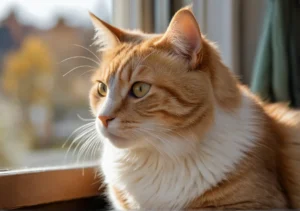Cats are mysterious creatures, known for their independence and nocturnal activities. Have you ever wondered why cats seem to go missing more often at night than during the day?
As natural hunters, cats are more active during the night when their prey is also active. This increased activity can lead to cats roaming further from home and potentially getting lost.
Cats’ Nocturnal Nature
Cats are mysterious creatures, with a natural nocturnal instinct that often leads them to venture out into the night. This behavior can be traced back to their days as hunters in the wild, where they relied on the cover of darkness to stalk their prey. While we may want them curled up next to us in bed, our feline friends are wired to be more active when the sun goes down. Their keen senses and agile bodies make them perfectly suited for the night-time hunt.
Increased Prey Availability
The darkness of the night opens up a world of opportunities for our curious cats. With fewer distractions and a higher chance of spotting potential prey, cats are more likely to roam and explore during the nighttime hours. This increased prey availability triggers their hunting instincts, leading them to wander further from home in search of a tasty treat. It’s like a cat playground out there in the shadows.
Keep your cat entertained : Providing interactive toys and engaging activities during the day can help satisfy their hunting instincts and reduce the urge to roam at night.
Secure your home : Make sure windows and doors are secure to prevent your cat from wandering off into the night.
Consider indoor enrichment : Creating a stimulating indoor environment with scratching posts, climbing structures, and puzzle feeders can keep your cat mentally stimulated and less likely to venture outside.
Remember, understanding your cat’s natural behaviors and providing a safe and stimulating environment can help keep them safe and happy, whether it’s day or night.
Disorientation in the Dark
Cats’ natural night vision is a remarkable adaptation that can sometimes work against them. While they can see well in low light, this can lead to disorientation in unfamiliar areas at night. Imagine being able to see shadows and shapes, but not the familiar landmarks that guide your way. This can cause cats to wander off and become lost, especially if they are exploring a new neighborhood or chasing after an intriguing scent. To help prevent this, ensure your cat has proper identification, such as a collar with an ID tag or a microchip, so they can be easily reunited with you if they do get lost in the dark.
Seeking Shelter and Warmth
Cats may also go missing at night in search of shelter or warmth, especially during colder months. They are naturally drawn to cozy spots to curl up and rest, so if they feel their current sleeping area is inadequate or uncomfortable, they may venture out to find a better option. This can be concerning if your cat is an indoor pet, as they may not be equipped to handle the challenges of the outdoors. To prevent this, ensure your cat has a warm and inviting sleeping area indoors, with plenty of blankets or a heated bed to keep them comfortable. Additionally, sealing any potential escape routes, such as open windows or doors, can help keep your cat safe and snug at night.
Helpful Tip: Consider setting up a cozy shelter or designated outdoor sleeping area for your cat, complete with a warm bed and shelter from the elements. This can provide a safe alternative for them to seek shelter and warmth without wandering off.
Potential Dangers
When your beloved cat ventures out into the mysterious night, they face a multitude of dangers that could put their safety at risk. From speeding cars to cunning predators, the darkness poses unique threats to our furry friends. Traffic accidents are a common hazard for outdoor cats, as drivers may not see them darting across the road in the shadows of the night. Predators like coyotes or owls lurk in the darkness, ready to pounce on unsuspecting felines. Additionally, cats can easily become disoriented and end up trapped in unfamiliar places such as sheds or garages, unable to find their way back home.
Preventative Measures
To keep your cat safe and sound during the night, consider implementing these helpful preventative measures. Keep your feline friend indoors during the evening hours to shield them from the dangers that lurk outside. Ensure they have proper identification such as a collar with a tag or a microchip, so if they do go missing, they can be easily reunited with you. Create a secure outdoor enclosure for your cat to enjoy the fresh air and moonlight without the risks that come with roaming freely at night.
Unique Insight: Installing motion-activated lights outside your home can help deter predators and provide better visibility for your cat if they do venture out at night.
- Secure the perimeter: Check your yard for any potential escape routes like holes in fences or loose gates.
- Nightly headcounts: Before bedtime, do a quick check to ensure all your cats are safely inside.
- Comforting scents: Consider using calming pheromone diffusers indoors to reduce the urge for your cat to wander outside.
Remember, a little extra precaution can go a long way in keeping your furry friend safe during the mysterious nighttime hours.
The Importance of Microchipping
One crucial way to increase the chances of finding your cat if they go missing at night is by microchipping them. A microchip is a tiny implant placed under your cat’s skin, containing a unique identification number. If your cat is found and taken to a shelter or veterinarian, they can scan the microchip to retrieve your contact information and reunite you with your furry friend.
Microchipping is a safe and permanent form of identification that significantly boosts the odds of a happy reunion. Unlike collars, which can break or fall off, a microchip offers a reliable way to ensure your cat can be identified even if they wander far from home. So, if your cat tends to roam at night, consider getting them microchipped to protect them and provide peace of mind.
In case your cat decides to go on an unexpected adventure in the dark, a microchip could be the key to bringing them back safely. Remember, it’s a small investment that can make a big difference in keeping your beloved pet close, especially during those mysterious nighttime escapades.
Fun Facts About Cats and Nighttime Behavior
Cats are known for their mysterious and fascinating behaviors, especially when the sun goes down. Here are some intriguing fun facts about cats and their nighttime antics:
Nocturnal Hunters: While cats are domesticated, many still retain their ancestral hunting instincts. At night, your cat may become more active, chasing imaginary prey or stalking insects that come out in the dark.
Purring in the Dark: Have you ever noticed your cat purring louder at night? Cats are known to use their purring not only for relaxation but also as a way to communicate with their owners in low-light conditions. So, that late-night purring session might be your cat’s way of saying hello in the dark.
Nighttime Zoomies: If your cat suddenly starts darting around the house like a tiny race car at midnight, don’t be alarmed. These “zoomies” are common behavior for cats, who often have bursts of energy when the world is quiet and still.
Dark-Adapted Eyes: Cats have exceptional night vision, thanks to their unique eye structure. Their eyes contain more rods, specialized cells that help detect low light, allowing them to navigate in the dark with ease.
Dawn and Dusk Activity: Known as crepuscular animals, many cats are most active during the hours of dawn and dusk. This behavior stems from their instinct to hunt during the transitional periods when prey is most abundant.
Discovering more about your cat’s nighttime behaviors can deepen your bond and understanding of their natural instincts. So, next time your furry friend disappears into the shadows, remember they may just be following their innate nocturnal habits.
Alex, a passionate animal lover, has experience in training and understanding animal behavior. As a proud pet parent to two dogs and three cats, he founded AnimalReport.net to share insights from animal experts and expand his knowledge of the animal kingdom.




